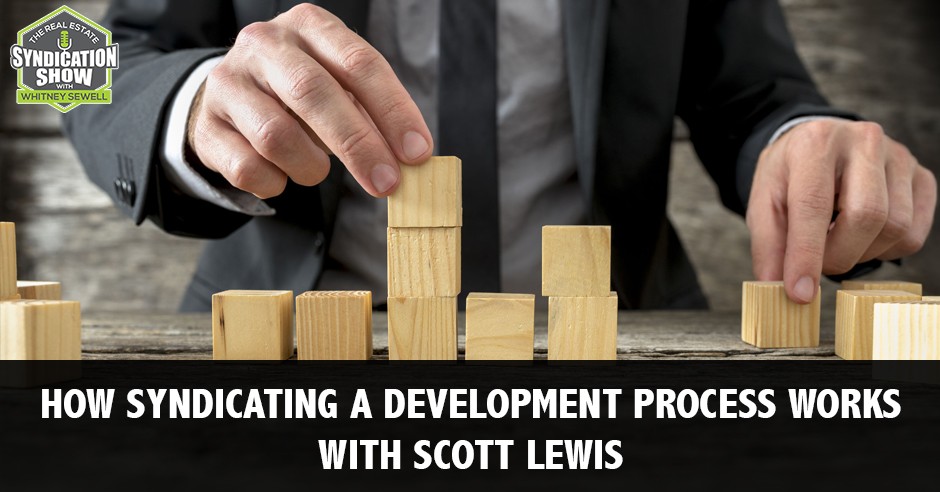
Syndicating a development process can be the most laborious procedure you will encounter during syndication. Talking about this meticulous process is Scott Lewis, the Co-Founder and CEO of Spartan Investment Group, LLC. Scott describes the development process as a two-year rollercoaster ride. For Scott, you must be willing to deal back and forth in terms of the entitlement, the horizontal phase, and the jurisdiction from the locals. Furthermore, Scott shares how it is critical and advantageous for you as a developer to understand early what zoning code is all about. Know more as Scott tells us all about syndicating development processes.
Our Gracious Sponsor:
Are you tired of answering emails from investors about when they’ll receive their K-1s?
Let The Real Estate CPA handle the accounting and taxes on your next syndication and they’ll file your tax returns by March 15th so you can get K-1s to your investors by the individual filing deadline on April 15th.
Not only will this reduce headaches, but it will help you retain investors over the long-term by improving investor experience.
The Real Estate CPA is now offering a Special Virtual Workshop to the listeners of The Real Estate Syndication Show on How to Answer Tax Related Questions from Your Investors!
Learn more today by visiting: http://bit.ly/TheRealEstateCPA-Syndication
—
Watch the episode here:
How Syndicating A Development Process Works with Scott Lewis
Our guest on this episode is Scott Lewis. Thanks for being on the show again, Scott.
Thank you very much, Whitney. I’m glad to be here.
Scott was on show number WS20. I would encourage you to go back and read that episode if you want to know more about Scott and the Spartan Investment Group. We’ve had all their team members on the show. You can learn about each of their team member and what their focus is and how they work together. It’s an interesting way to hear about different team members and why each one is important. Scott is the Cofounder and CEO of Spartan Investment Group LLC, also known as SIG. He’s led several successful real estate developments ranging from single-family flips or raw land development.
SIG has completed $6 million in development projects, has $9 million more underway and raised over $7 million in private equity. He leads the Spartan team by overseeing all operations, business activities to ensure they produce the desired results and are consistent with the overall strategy and mission. I also heard Scott speak in Denver at the Best Real Estate Investing Conference by Joe Fairless. It was great to see you there, Scott, the other team members and meet some of them in person. It’s a pleasure to see you there. It’s a pleasure to have you on the show. Give us a little more about your focus. Let’s dive into some of these topics like development. I get questions all the time about syndicating and development and you’re the guy that’s going to help us understand some of that.
The first question you’ve got to ask yourself is do you want to suffer through at least at a minimum, probably two years of a constant roller coaster ride of ups and downs as you move through the development process. It’s is a roller coaster ride. If you’re not good with ups and downs, you might want to think hard if you want to do development. The place to start is what is development and how does that differ from doing a deal? Development is taking a piece of raw land that has absolutely nothing on it, sticks, trees, whatever and going through what’s called the entitlement phase to get it ready to go ahead and build whatever you’re going to build.
At Spartan Investment Group, we focus on self-storage. That’s what we look for. The horizontal phase of the development that’s taking the raw land and moving it through the bureaucratic process of whatever jurisdiction you’re in, to get all of the necessary entitlements. Entitlements are the allowances to build what you want to build. It’s almost virtually the same for any asset class. It doesn’t matter if it’s multifamily, a carwash, storage or what have you. It’s working with the jurisdiction to walk through all of their processes, to get approvals, to go ahead, go vertical and build.

You talked about the entitlement, horizontal phase and walking through this with the city or the locals, the jurisdiction. I can imagine the back and forth, trying to figure out and make sure everybody is happy with what’s going on. It seems very difficult.
We call it the BS bucket. You have to be willing to deal with all kinds of various stakeholders, personalities and a lot of nonsense as you’re moving through the process. Most jurisdictions, they will publish timelines for approvals on whatever you’re trying to get approved. Most jurisdictions, they don’t adhere to it. It’s a willy-nilly. As a developer, it’s incredibly frustrating because we are the ones out here in the field with sometimes millions of dollars riding on the line and to be very whimsical on timelines, it is sometimes incredibly frustrating. You have to know that at the end of the day, whatever jurisdiction you’re dealing with, they have a job to do.
That’s to make sure that you build a project that’s not only safe but aligns with the overall, not only the politician’s vision for the future, but also the citizen’s vision of that jurisdiction for the future, which is why it can take so long. Then there are a lot of different agencies out there. It depends on your project. We’ve got a raw land development going on just outside of Seattle, Washington. In the State of Washington, there are a lot of different stakeholder groups. On this particular piece of dirt, there are some wetlands in there, which is a federally protected water of the United States. That’s the actual term for it, which adds a whole other layer of complexity and dealing with the Army Corps of Engineers. It’s a process. Here’s the thing about development, why do you want to do it? When you look at your regular value add deal where you go in and you put some new stoves in, you paint and you put a new carpet down. You might add 25%, 30% or you crush it, 40% of value to the project. With development, you can add several 100% of value. That’s risk-adjusted. There’s a lot of risk for that. People do development because the upside is incredibly up. The risk is there as well.
It seems like as far as entering the development world, it seems like almost another business. There’s a lot of things that carry over. There’s so much more there that I feel I would need to focus on and educate myself about before I say, “Do I want to jump into the development space?”
I would be very careful jumping into a large development without having a decent amount of experience or if you’ve got an education background. If you’ve worked for a large company that has done it, that could get you what you need to know. What eliminates risk in development is due diligence. At Spartan, we have a due diligence checklist that has 375 items on it. We’ve been told that’s one of the most exhaustive lists of due diligence items that folks have seen. It’s there because both me being an Army guy and my co-founder, Ryan, are being checklist fanatics. Everything we do are checklists. It’s one of those things that if you miss one of those boxes, it can be catastrophic.
Even if you’re buying a regular property, there’s still a good amount of due diligence that goes in. Unfortunately, a lot of people don’t do that like a phase one environmental. We’re purchasing an existing facility, it’s a storage facility but we’re at phase one. You never know what could be underneath there. Because if something is built does not mean that you don’t have development risk from geotech, from a phase one environmental in those various studies that we would do up front on a development phase. If you’ve got bad soils under your facility and you don’t do a geotech, you could be buying a facility that’s sinking.
[bctt tweet=”Do not go into a development play thinking it’s going to be smooth sailing because it will not be.” via=”no”]
The probability of that is pretty low but it’s there. If you’re spending multiple millions of dollars on a facility, that’s a big deal. If you buy a facility and there are underground storage tanks down there that you didn’t know about because you didn’t do a phase one because you’re like, “They must have done one or they have existing facilities. There can’t be anything wrong.” If those tanks are down there and you buy it, you own it. If you have to do environmental cleanup, it can be disastrous to your facility. Development definitely has more upfront. It has some of the very same things that buying an existing facility for a value-add play would have.
You’re talking about a phase one or phase two. Could you tell us about that? If a reader hasn’t heard that before, they’re thinking, “What’s he talking about phase one?” What does that mean?
Phase one is referencing an environmental inspection. I don’t know the ins and outs of what the scientists and engineers do when they go out. They test the land to make sure that there was no environmental hazard like underground storage tanks. Was this thing a gas station in 1945 that’s been torn down in the soils of disaster? There’s an old gas storage tank down there. Was this a brownfield, being an environmentally contaminated area? Was this a military base in training for World War I and all kinds of lead contamination from ammunition? Those are some that could have the environmental issues down there. It’s not a big deal.
Some people are too scared about a failed phase one. It’s not a big deal because you can fix most of things. If your phase one environmental fails, then you’d go to a phase two environmental, which is a much more rigorous test. There are probably folks out there that are far more versed in what those tests encounter. Even if phase two fails, there’s plenty of people that take on brownfields, which are disastrously contaminated areas. They go out and they do whatever mitigation and mediation that they have to get that back to where it’s a safe place to develop. It’s all about negotiating with the seller. If your phase one fails, don’t necessarily walk away from your deal. Get a contractor out there, understand the cost, scope and risk like mitigating whatever problem was there and negotiate a lower price. The seller wants to sell and you want to buy, let’s figure out how to work it.
When you find problems or you found those fuel tanks that you didn’t know that we’re there, don’t immediately write it off. Let’s get an expert out here. Let’s figure out what it’s going to cost to fix it or whatever it’s going to take to make this happen. If you pass it on, the next person that’s going to try to buy it or go through the due diligence, hopefully, they’re going to find the same thing. You might as well bring that to the seller and show them. This is what it’s going to cost. Hopefully, they’ll work with you.
I’ll be completely honest, we never have failed on environmental inspection. We have had some geotech issues and that’s the geotechnical basically looking at the soils and the underground geology of your site. We have had some problematic soils that all that is additional concrete work, additional shoring work or footing work for that particular facility. This drives the cost up. The capital of the United States is literally sinking because it’s built in a spot. It’s sinking very slowly. They’re doing a lot of work to renovate that. It is sinking so the story goes. You can basically build on almost anything. It’s the amount of work and the amount of costs that will go into it.

Sometimes those failed inspections will cause a project to become insolvent because the cost will be so great that the project no longer pencils, but that’s the name of the game. When you’re getting into development, they’re called pursuit risks. The costs associated with them are called pursuit costs. As a developer, you have to ensure that you suck some percentage of your operating capital away for failed pursue costs. Those folks that are out there that are thinking about doing development, make sure you’ve got enough stocked away that you can go after a couple of these deals. No matter what your due diligence is, it’s probably going to cost you at a minimum $5,000 if you find a problem right away. Otherwise, it can be upwards of $25,000, $30,000, $40,000 into the due diligence project before you hit a snag.
I wanted to ask you about these due diligence checklists that you talked about with over 300 points. How do you start to develop something like that? I know people have asked me that. I know the audience is probably wondering, “Where do I even start to make sure that I have the most exhaustive lists that I can have and make sure I’m checking all those boxes like you all have?” Where did you start and how did you create something like that?
We started by identifying the “high level” buckets or categories in which we want to assess due diligence. One of ours is zoning. When you’re doing development, the zoning code is one of the most important things to understand. When you looked at zoning, we started listing off all the different things that we had learned over the years about zoning. We also then went out to Google. We looked at maybe seven to ten different checklists for the various areas of due diligence on zoning. Everybody has a different checklist. Our checklist of 300-plus items is an amalgamation of probably 30 or 40 different checklists that we went out and found in all these different categories. We started putting them together and tailoring them to our methodologies in the way that we develop.
You talked about the zoning. You talked about different things. Maybe you could highlight a few things when doing a development that you all have run into that we wouldn’t normally think of. Maybe you’ve learned a few things that you’re going to check on every deal that you didn’t know on the first couple of developments or when you first got started. What would those be?
There’s a concept called a matter of right. In the zoning code, there are different classes and every jurisdiction does this different. There are different classes or categories or however they decide to call them. It’s all semantics. It all means the same thing. Each one of those classes or categories has what is allowed and the nuances with what’s allowed like the setbacks, the amount of impermeable surface that you’re allowed to have. There’s a concept in there called matter of right, which means that what you want to do for your piece of dirt is allowable by the zoning code.
It doesn’t require what’s called a conditional use or special use permit. The vernacular is different in every jurisdiction. Whenever you introduce a conditional use or special use permit, there is a level of risk at a minimum quadruples. When you’re going through the process for conditional use or special use, it is dependent on the whims of both the jurisdiction and the surrounding public because you have to hold public hearings. Anytime you introduce the public into it, you can introduce a lot of variable risks that you cannot control. We didn’t control this deal. This was a deal we invested in. It was a ground-up development.
[bctt tweet=”A couple of hundred dollars spent on due diligence is a lot less grief than getting into a deal that then goes sideways on you.” via=”no”]
We did not do enough due diligence to ensure that it was a matter of right versus conditional use. This deal ended up being a conditional use. This other sponsor didn’t do the level of due diligence that they need to do. We learned very quickly on the number one thing that we look at right out of the gate, whether our project on this piece of dirt is a matter of right or conditional use. Unfortunately, we went into the deal thinking it was a matter of right when the response we got was wrong and It was a conditional use. Instead of a six to nine-month turnaround, we’re now going on three years.
That’s a big difference. You said six to nine-month turnover, you’re going on three years. That changes things drastically.
It does and that’s the number one lesson that we learned. This person was very close to us. My wife and I are investors in this deal. We’re not sponsors of this deal. We did not do the level of our own due diligence. For the investors that are reading, make sure that you do your own due diligence and don’t take the sponsor’s word for it. Dig in all due diligence documents that they have.
As an investor, what due diligence documents or questions should we be asking our sponsor or operator?
I’ll jump back and forth as the sponsor and then as the investor for a development play. As an investor, the number one thing you want to make sure, if you want to verify without a shred of doubt of whether that project is going to be matter of right or it’s going to require a conditional use or special use or some type of approvals outside of matter of right, that is everything for the development project. Nothing else matters. The finances don’t matter. The amazing marketing materials don’t matter. If you don’t understand if it’s a matter of right or some other type of approval process, you’re going to get yourself into a situation in which you could have a project that’s much longer on your hands than what you’re anticipating.
If the sponsor hasn’t figured that out, in hindsight, I would never have invested in this deal with this particular spot and I will never give him another dollar. Part of it is on us. We own that amount of accountability that we didn’t do that. That’s why I’m stressing it. From the sponsor’s side of the house, for us, we make sure that our investors, especially on a development project, have access to all of the zoning reports that we’ve pulled. We do a zoning report for any development that we do. We provide that zoning report. Generally, before we even bring investors into the deal, we’ve done some of the due diligence already. Usually the phase one geotech in any of the other studies that are required.

Make sure you provide your investors with copies of those. Most investors won’t read them. I give them to a civil engineer and ask them to read through them quick. It will cost you a couple of hundred bucks. A couple of hundred bucks spent on that due diligence is a lot less grief than getting into a deal that then goes sideways on you. I would say from an investor’s side of the point, the understanding of the underlying zoning. From a sponsor standpoint, make sure that you provide your investors the information that they need to make an informed decision.
I like how you talked about you all already have some of these documents or have already begun the process before you approach investors. On many levels, that shows you’re trying to be transparent. It shows you’re committed to the deal. It shows you’re already invested. There’s already an alignment of interest before you ever approach the investor.
There’s a lot of talk about co-invest from the investor’s side of the house. As an investor for me, I’ll be completely honest, I don’t care if the sponsor is putting money in the deal or not. Especially on a development side of the house and especially if that sponsor is bringing a loan to the table, that sponsor is putting an awful lot on the line. Normally I’m a $50,000 to $100,000 guy. It’s usually what I do per deal unless it’s a smashing deal, then I might do more. If they’ve done it right, by the time they’re asking me for money, they probably have at least $50,000 in with that risk for those pursuit costs.
If the sponsor has done it right, and this is what Spartan Investment Group does, we make sure that we are confident that this deal is going to go before we take a dollar from our investors. On that black diamond deal, we probably had $250,000 of our money into the deal before we took investor capital. Most of that was paid back out for expenses, but all of that was at risk until we got comfortable enough that like, “This project is going to go. We’ve got our conditional use approval that was not a matter of right deal. We’re ready to bring investors in.”
Scott, leave us with a few things that we need to know about development deals or if we’re going to invest in a development deal or any closing thoughts about that specifically.
These are two points for each side of the house. As a sponsor, be prepared to get up and down. Be prepared that any jurisdictional timeline you get, my recommendation when you’re putting your schedule together would be to almost double whatever timeline has put out there with jurisdiction. They almost never adhere to it. Do not use them as they stand and putting together your timeline. For investors, be ready to go for that same ride, be ready to go up and down. Be ready for the product to take longer and give the sponsor a break.
If that sponsor is communicating to you, I will say that the one that we got sideways was not. In this case, I would say to do whatever you need to do to get that sponsor’s attention. If they’re communicating regularly and you’re in the light and you know what’s going on, then give them a break. They’re off at the whim of a lot of different stakeholders in which they’re trying to control. If you’re getting into a development play, the returns are going to be a representative of the risk of the deal. Do not go into a development play thinking it’s going to be smooth sailing because it will not be.
What’s the number one thing you’d say has contributed to your success?
In the development side, we learned early to understand the zoning code. We had a couple of projects that back in our residential days, that’s one of the things that we focused on is knowing the underlying zoning. We had a couple of projects that we were able to buy on a severe discount because the seller did not understand the zoning that the project had. We repurposed it for something that was much higher, better and more valuable. Understanding zoning code was pivotal in our success and not getting into something that we don’t understand other than that investment, which was not ours.
Is there a way that you all improved your business that we could all apply to ours?
The number one thing that we’ve done lately to improve our business is we’ve been pretty process-oriented in the past. What we’ve done lately is integrated some of our technology with our processes, with connecting some of our different systems like Podio, to our Trello or our Smartsheet accounts to have more seamless project management. While we have these as an independent standalone system, integrating them so they all talk to one another has helped us out lately.
How do you like to give back?
Personally, I like to give back and I’ll be completely honest, I’m not a fan of giving money to charity. I like to give them my time to helping folks. One of the things I do here in this Colorado area is I coach the local middle school mountain biking team. They’ve got the team started and they’re trying to get kids interested in mountain biking there. They were struggling to get parents. My wife and I don’t have kids, but we want to see them succeed. I volunteer in the summers coaching middle school mountain bikers.
I haven’t heard anybody that does that before especially with those young ones. You’re a great example for them. I appreciate that. Scott, tell the audience how they can learn more about you and Spartan Investment Group.
I can be reached at Scott@Spartan-Investors.com. Your audience can check us out at www.Spartan-Investors.com.
Scott, thank you again for your time, expertise and going through some parts of the development process that most of us wouldn’t know. It’s not my focus. It’s great in learning how important the zoning code, how unimportant sometimes the timeline or that they gave you is going to bear and you need to double it as far as on the investor side and on the sponsor side. I appreciate your time. I hope the audience will go and look at Scott’s website. Also, go to Life Bridge Capital and connect with me. I’d love to have a call with you and then go to The Real Estate Syndication Show on Facebook so we can all learn from experts like Scott and his team and grow our business together.
Important Links:
- Scott Lewis
- WS20 – previous episode
- Spartan Investment Group LLC
- Best Real Estate Investing Conference
- Podio
- Trello
- Smartsheet
- Scott@Spartan-Investors.com
- www.Spartan-Investors.com
- The Real Estate Syndication Show on Facebook
About Scott Lewis
 Scott Lewis is the co-founder and Chief Executive Officer of Spartan Investment Group, LLC (SIG) and has led several successful real estate developments ranging from single-family flips to raw land development. To date, SIG has completed $6M in development projects, has $9M more underway, and raised over $7M in private equity.
Scott Lewis is the co-founder and Chief Executive Officer of Spartan Investment Group, LLC (SIG) and has led several successful real estate developments ranging from single-family flips to raw land development. To date, SIG has completed $6M in development projects, has $9M more underway, and raised over $7M in private equity.
As the Chief Executive Officer, Scott is responsible for developing business strategies and plans ensuring their alignment with short-term and long-term objectives. He leads the Spartan team by overseeing all operations and business activities to ensure they produce the desired results and are consistent with the overall strategy and mission
In addition to Spartan, Scott is also a Major in the US Army Reserves and is an Operation Iraqi Freedom Veteran. He has held various positions including Infantry Platoon Leader, Military Police Company Commander, Officer Candidate School Platoon Trainer, amongst others.
Scott graduated from Michigan State University with degrees in Chemistry and Marketing, from Catholic University with an MS in Management, from Georgetown University with a Certificate in Project Management, and has his Project Management Professional (PMP) Certification
In his free time, Scott enjoys spending time with his wife, Lindsay, mountain biking, skiing, and chasing their two Jack Russell Terriers around the yard.



